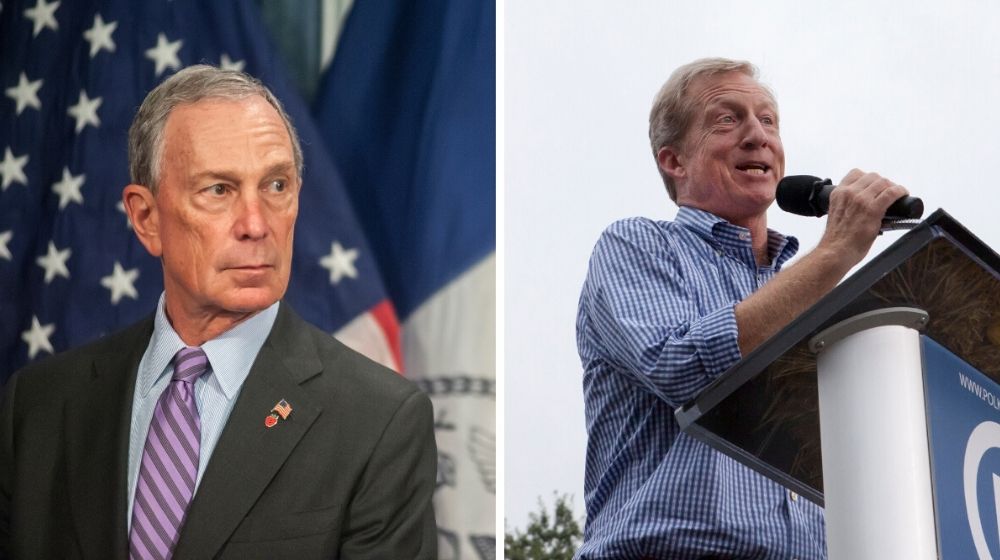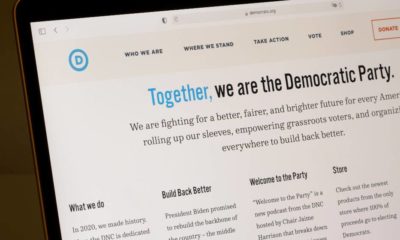Money
Billionaires’ $15m on Campaign TV Ads Could Have Helped Ease Homeless Crisis

The two billionaire candidates in the Democratic presidential race together spent roughly $15m on television ads in California leading up to Thursday’s debate. If that money were spent on homeless people suffering from the state’s severe and worsening housing crisis, advocates say, it could help thousands in need find a roof over their heads.
Ahead of the sixth Democratic primary debate in Los Angeles on Thursday, the billionaires at the bottom of the polls, Michael Bloomberg and Tom Steyer, poured $13.5m and $1.6m respectively into TV ads in the state, according to Advertising Analytics, which monitors political ads. The ad buys renewed criticism of both the vast amounts spent in the presidential race and independently wealthy candidates’ relying on their own fortunes to fund key aspects of their campaigns.
The Guardian asked housing researchers and experts what difference $15m could make in one of California’s most pressing crises – homelessness. Thursday’s debate brought a national audience to a county with extreme income inequality, home to some of the world’s wealthiest people as well as an estimated 59,000 homeless residents – many on the streets for the first time due to evictions and unaffordable rents..
The experts agreed it would be less than drop in the bucket given the scale of the public health emergency, but said it could still provide life-changing help for a sizable number of families in the most dire situations.
In Los Angeles for example, $15m could provide new shelter for roughly 1,800 homeless people, estimated the Rev Andy Bales, CEO of Union Rescue Mission (URM), which runs a shelter at Skid Row, the area home to massive tent encampments in downtown LA. His organization was recently able to open a sprung structure shelter in a parking lot that can house 120 women at a cost of roughly $1m.
There is growing interest in expanding that model in the region, he said, calculating that $15m could provide immediate shelter for 1,800 people. The goal of these shelters is to transition people into permanent housing, give them access to case managers, housing services, medical and mental healthcare, three meals a day, and beds and a roof over their heads.
“They stay as long as it takes to get on their feet and into housing,” he said. “That campaign money might go further if it was used to address the real situation, rather than spent on TV ads.”
With more than 44,000 homeless people estimated to be living outside in LA county in cars, tents or makeshift quarters, the need for more beds and protected shelter space is dire. More than 1,000 homeless people died in the county last year. Some advocates, however, have urged governments to prioritize permanent housing instead of the expansion of emergency shelters, which can sometimes offer poor conditions.
In LA, $15m could also fund a total of roughly 30 new individual units of supportive housing for homeless people, estimated Gary Painter, director of the Homelessness Policy Research Institute at the University of Southern California. With families, those units could potentially offer housing for about 50 people.
Even if that number seemed small, Painter noted that access to supportive housing can change the trajectory for families for years, potentially saving future generations from instability and homelessness: “One could imagine that investment on vulnerable families paying off in the long term.”
Bales estimated that $15m could also provide supportive community homes for roughly 100 homeless people suffering from mental illness in LA.
One-off philanthropic donations won’t resolve homelessness in California, which is a chronic and systemic problem, and advocates caution that the government has a responsibility to tackle the structural issues that drive the crisis.
“We’re not a poor state that can’t afford to solve this problem,” said Eve Garrow, homelessness policy analyst with the American Civil Liberties Union of Southern California, noting that the state has the world’s fifth-largest economy and needs to focus on permanent, affordable housing.
Diane Yentel, president of the National Low Income Housing Coalition, noted that California has already poured billions into homelessness and that it’s not nearly enough, given that for every 10 of the lowest-income renters in the state, there are fewer than two affordable homes available: “It’s really the role of the federal government to step in and invest in the scale of solutions that are needed.”
But thinking through the potential impacts if this ad funding was spent on direct actions can be a helpful reminder of how the massive amounts of money flowing into America’s political system.
Steyer, a California billionaire who has poured his own money into advocating impeachment of , fighting the climate crisis, voter registration initiatives and other issues, has argued that the money he is spending on his campaign is not taking away from his support of progressive causes.
Bloomberg entered the race last month and didn’t qualify for the debate this month, but has spent $117m on ads across the country, recently flooding the LA market.
In the past 90 days, Steyer’s campaign also spent more on Facebook ads targeted to California, according to Anna Massoglia, a researcher with the Center for Responsive Politics. He spent more than $1.2m on Facebook in the state, while Bloomberg spent more than $650,000. Pete Buttigieg’s campaign spent $250,000 on Facebook during this period.
Julián Castro, the former housing secretary and a 2020 candidate who did not qualify for the LA debate, did spotlight the homelessness crisis this week with a visit to Skid Row.
Asked about the money his rivals have spent on ads, he told the Guardian: “What we’re seeing in this election cycle is that too often times in politics, money still talks. People can basically buy their way on to the debate stage. They can buy increases in polling very quickly when you dump $100m on TV ads. We need to get to a time in this country where money doesn’t talk the same way that it does today.”













4 Comments
Either way, it’s a waste of money.
Every state and city that was under control of the Demarats, have failed. I live in Michigan and I watched Flint, Grand Rapids and Detroit go under because of Demarats control. They only care about their pockets and the people are the providers. And that’s not the worse. The UN is. They adopted a policy that no one in AMERICA a say in. That is, they can dump refugees in any city or state with out our say. That’s why Trump is trying to pull out of the UN. The media and the Demarats don’t want any one to know their scams.there’s so much going on. It would be a book by the time I’m done. People need to start looking at what’s going on. Before it’s too late.
Ego trips, nothing else!
Does anyone actually believe these people who have amassed so much money did that so they could help people??? I suppose it’s a possibility, but from the things they have actually done that we can see, it looks more like they just want to use their wealth to tell OTHER people how to live, not to support them in growing and becoming whatever they want to be.
Nope, Gloomberg and Steerer want to tell people what to do, so they give money NOT to individuals in the form of grants or even bonds or investments, but to the Democrat Party to get more Globalist givers of ORDERS to tell everyone to line up and shut up. Fascists.